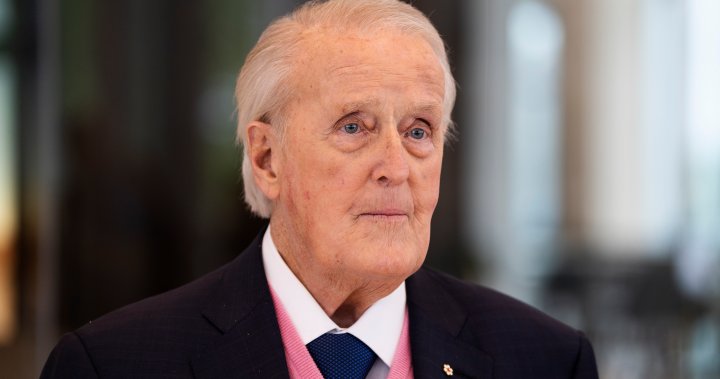Former Canadian prime minister Brian Mulroney has died at the age of 84.
Born in Baie-Comeau, QC., in 1939, Mulroney would go on to build a political career marked by his leadership of the at-times fractious coalition of Western conservatives, Red Tories and Quebec nationalists that made up the old centrist Progressive Conservative Party, and a legacy of securing a original NAFTA trade deal with the U.S. and Mexico as well as passing the goods and service tax into law.
His death comes at a time when conservative movements around the world are struggling with existential challenges to Western democracies and civil rights amid a rise of populist and authoritarian elements within their ranks.
Mulroney is survived by his wife, Mila, and four children. Caroline Mulroney is Ontario’s transport and francophone affairs minister, and Ben Mulroney is a well-known TV personality. Both Mark and Nicholas Mulroney have careers in banking.
Mulroney’s breakthrough victory in Quebec in the 1984 federal election netted the party 58 seats in a traditional Liberal stronghold. For most of the previous century, the PCs had found themselves in a trap that had helped keep them largely out of power – without success in Quebec, they became a mostly Anglophone party, and as such they had continued limited traction in Quebec.
He also was no stranger to scandal, and was investigated by the RCMP after leaving office for accepting kickbacks from a German businessman, Karlheinz Schreiber, related to the sale of Airbus planes to Air Canada. Mulroney told a parliamentary inquiry in 2010 that these payments had been for lobbying and consulting services, but Jeffery Oliphant, the judge who ran the inquiry, found no evidence that any services had ever been carried out.
Although he told Tories as he ran for the party leadership in 1983 that civil servants would be issued “pink slips and running shoes,” Mulroney governed from the centre, with a foreign policy well to the left of other conservative national leaders of the time, like Margaret Thatcher and Ronald Reagan.
The Liberals started the 1984 federal election, Mulroney’s first as PC leader, in the lead. A series of missteps by Liberal leader John Turner saw the party falter in the polls, but a memorable moment in the leaders’ debate set the stage for a PC landslide.
Pierre Trudeau, as he left office, had named a large group of Liberals to a range of federal appointments, widely seen as patronage. John Turner, who had just succeeded Trudeau, had confirmed the appointments.
The email you need for the day’s
top news stories from Canada and around the world.
Confronted about the appointments during the debate, Turner said he had had “no option.”
Mulroney pounced.
“You had an option, sir,” he said, pointing an accusing finger. You could have said, ‘I am not going to do it. You had an option, sir, to say no.’
Turner was visibly flustered. “I had no option,” he repeated.
“That is a confession of non-leadership,” Mulroney replied.

After that, it was all over but for the counting. The election that followed saw the PCs more than double their seat total to win the first majority for the party since John Diefenbaker’s victory in 1957.
In power, Mulroney signed the free trade deal with the U.S. and Mexico known as NAFTA, which was a major point of contention under the Trump administration and saw Canada dragged into talks to renegotiate the deal, now known as the USMCA or CUSMA.
Free trade with the United States was bitterly controversial at the time, but Mulroney fought the 1988 federal election on the issue and won a second majority government.
“Throughout our history, trade has been critical to Canada’s livelihood. Now, almost one third of what we produce is exported. Few countries in the world are so dependent on trade. This trend ultimately threatens the jobs of many Canadians and the living standards of the nation as a whole,” Mulroney said in defence of the agreement in 1985.
“We must confront this threat. We must reverse this trend. To do so, we need a better, a fairer, and a more predictable trade relationship with the United States.”
But Mulroney’s attempts to reach a constitutional deal with the provinces, his other main priority as prime minister, were less successful.
Mulroney’s first attempt to amend the Constitution, the Meech Lake Accord, failed in 1990. The Charlottetown Accord, his second attempt, failed to pass a national referendum in 1992.
As Mulroney leaves power, party disintegrates
By 1993, Mulroney had stretched his second government to the very end of its mandate – legally, an election had to be held that year. His coalition was splitting apart as the Reform Party gained strength in the West and rural Ontario, and Lucien Bouchard, a separatist-turned-federalist-turned-separatist who had been Mulroney’s Quebec lieutenant, resigned to start the Bloc Quebecois.
Mulroney resigned as PC party leader, succeeded by Kim Campbell, who briefly became Canada’s first female prime minister.
Between Mulroney’s personal unpopularity and the two splits in the party, Campbell was given an impossible hand to play. She presided over a defeat for the PCs that saw the once-mighty party reduced to two seats – Campbell’s not among them.
Mulroney had failed to lay the groundwork for a PC coalition that would endure after he left the scene.

In the short term, the PC disintegration led to unbroken Liberal governments that lasted until 2006.
For conservatives, the 1993 defeat led to a long, torturous process that eventually led to the founding of the modern Conservative Party in 2003.
While the unified party saw electoral success under Stephen Harper, it also saw the right wing of the party take on new prominence and the old Red Tory presence in Canadian federal politics diminished – a trend that has continued as Conservative leadership candidates increasingly set out to prove their “true blue” and “true conservative” visions to party members.
—with files from Global’s Amanda Connolly and former Global News reporter Patrick Cain




